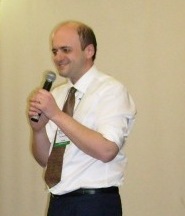| Pages in topic: [1 2 3] > | Off topic: What "dialects" do you speak? Thread poster: Henry Hinds
|
|---|
Henry Hinds 
United States
Local time: 08:41
English to Spanish
+ ...
In memoriam
I don't know if "dialect" is the right word, it is probably too strong, but I use it for lack of a better one to describe different identifiable "versions" of a language. Surely it is a phenomenon that exists in all languages to some extent, which is identified not only by geographic location but also by social and educational factors. It can consist of different cues such as accent, pronunciation, tonality, idiomatic expressions and mannerisms that a careful, knowledgeable observer could pick u... See more I don't know if "dialect" is the right word, it is probably too strong, but I use it for lack of a better one to describe different identifiable "versions" of a language. Surely it is a phenomenon that exists in all languages to some extent, which is identified not only by geographic location but also by social and educational factors. It can consist of different cues such as accent, pronunciation, tonality, idiomatic expressions and mannerisms that a careful, knowledgeable observer could pick up on and say "you talk like you might be from...".
Of course by our very presence here we all speak more than one language. So the question is, what "dialects" do you speak? Do you speak one (we all should have at least one) that is regarded as "native" and identifiable with a certain group or area? Do you even speak more than one that is regarded as "native" and identifiable with a certain group or area? Or is your speech in second (or third) languages clearly recognizable as being non-native? Or have you adopted what we might call a "cultured" version in your native language or any other?
With the multinational languages of the world, what country's "dialect" do you identify with, even though you would not be regarded there as a "native". Or for languages that cover only a small area, might there be only one or several "dialects" that you might know and use? Of course that can apply to the multinationals as well.
I suppose those questions are only a beginning, just to stimulate some discussion and perhaps come up with some interesting phenomena that many of us are not aware of.
As a start I can share my own case. I am a speaker of US English and Mexican Spanish, both identifiable as native and even by region. Any American would identify me as being from the US, and I consider my manner of speech to be fairly "standard" and not regional. That is to say, none would ever think that I was from the Old South or the East Coast, for instance. Being a native of California, there is not a lot to distinguish the accent from standard US.
On the other hand, when I say I live in Texas, they say "oh, but you don't have a Texas accent". It's then that I have to tell them that the accent in El Paso is, well... Mexican, because we speak more Spanish than English. Along that line then, my Spanish is not only Mexican, it is Cd. Juárez, which is the large Mexican city right next door. I could never be mistaken for a "chilango" (Mexico City resident) or being from the south, but people will definitely identify me with the north. In addition, I can also do quite well in "Tex-Mex" or "Spanglish", though being a purist, I prefer to avoid it.
Many years ago I was also able to become quite convincing in the Chilean dialect after a long residence there, but on visits today the Mexican accent gives me away as it did when I first arrived in that country. It is just something that cannot be adjusted to from one day to the next.
So let's hear your experiences... ▲ Collapse
| | | | | I speak the dialect of my hometown... | Jul 15, 2008 |
...which is very funny, and very crude, and practically useless for any other purposes, except for buying things in my town (if you show you are a native, they will probably not try to cheat you).
An example of my dialect can be found here:
http://www.youtube.com/watch?v=ynwj0ExxuE4 (a movie filmed in my hometown, Bari, Southern Italy, with local people, and strictly in diale... See more ...which is very funny, and very crude, and practically useless for any other purposes, except for buying things in my town (if you show you are a native, they will probably not try to cheat you).
An example of my dialect can be found here:
http://www.youtube.com/watch?v=ynwj0ExxuE4 (a movie filmed in my hometown, Bari, Southern Italy, with local people, and strictly in dialect, with subtitlings for non-locals ) )
Enjoy
Giusi ▲ Collapse
| | | | | Definitely economically useful | Jul 15, 2008 |
I translate from Italian to English. I arrived in Milan Italy at the late age of 28, when the muscles of my larynx were too firmly set and my hearing no longer sufficiently acute to lose my native English accent. However, when in shops for example people think I don't understand, "You prefer I speak English?" I just reply with "mi sum minga milanes," (I'm hardly Milanese in Milanese dialect), "ma capisco l'italiano" (but I do understand Italian) and it works wonderfully. They relax because the... See more I translate from Italian to English. I arrived in Milan Italy at the late age of 28, when the muscles of my larynx were too firmly set and my hearing no longer sufficiently acute to lose my native English accent. However, when in shops for example people think I don't understand, "You prefer I speak English?" I just reply with "mi sum minga milanes," (I'm hardly Milanese in Milanese dialect), "ma capisco l'italiano" (but I do understand Italian) and it works wonderfully. They relax because they feel sure I understand every word I speak and the taxi drivers think twice about charging me double fare.
On another tack, my wife is from the Seychelles where they speak the Seychelles dialect of French creole, which I speak lets say "proficiently". I never pay tourist prices and that is a huge saving, especially for scuba diving. With my wife one day we once met a person from Santa Lucia in the Carribean on a railway station in Verona and were able to have a fair conversation in Creole. I believe the two Creoles developed historically in parallel, with no common origin, one being a West African-French contact language and the other an East African-French contact language, just as English is an old French-old German contact language. and that is a huge saving, especially for scuba diving. With my wife one day we once met a person from Santa Lucia in the Carribean on a railway station in Verona and were able to have a fair conversation in Creole. I believe the two Creoles developed historically in parallel, with no common origin, one being a West African-French contact language and the other an East African-French contact language, just as English is an old French-old German contact language. ▲ Collapse
| | | | |
|
|
|
We Hungarians are lucky wrt to our mother tongue... there is just one standard accent (and no real dialects to speak of, just a couple of accents perceived as rural or even uncouth) and the standard is what I speak.
My English is a reasonably convincing (but noticeably foreigner's) British RP with the odd US term creeping in (for some reason I can't get myself to say "lorry". They are trucks to me, don't ask me why.)
My Spanish is the Spain variety, much less convincing... See more We Hungarians are lucky wrt to our mother tongue... there is just one standard accent (and no real dialects to speak of, just a couple of accents perceived as rural or even uncouth) and the standard is what I speak.
My English is a reasonably convincing (but noticeably foreigner's) British RP with the odd US term creeping in (for some reason I can't get myself to say "lorry". They are trucks to me, don't ask me why.)
My Spanish is the Spain variety, much less convincing though
A Spanish guy told me I sounded a bit Latin American after I spent a month in Mexico... I think my Spanish really sounds "foreign" though. ▲ Collapse
| | | | | The dialect of my hometown, too | Jul 15, 2008 |
I speak the "dialect" of Corfu, which is Greek, with a particularly "singing" accent. The version spoken in Corfu Town has a lot of vocabulary deriving from Italian (due to 500 years of Venetian rule). In the countryside people talk in more or less the same accent, but they use vocabulary deriving mainly from ancient or medieval Greek.
As Giusi said, people don't try to cheat you when they identify you as one of the locals. Moreover, I use my local dialect to express feelings and t... See more I speak the "dialect" of Corfu, which is Greek, with a particularly "singing" accent. The version spoken in Corfu Town has a lot of vocabulary deriving from Italian (due to 500 years of Venetian rule). In the countryside people talk in more or less the same accent, but they use vocabulary deriving mainly from ancient or medieval Greek.
As Giusi said, people don't try to cheat you when they identify you as one of the locals. Moreover, I use my local dialect to express feelings and thoughts which I simply cannot express through the use of official Greek or of any other language. The simple intonation of a phrase, without having to use any local vocabulary, can make a huge difference.
Nearly half the population of Greece live in Athens, which means that a lot of the different identities which still exist in the various parts of the country is getting lost. Living in a place with a special character in language or even mentality makes me feel very special - it's like an act of opposition to an increasingly uniform world around me. ▲ Collapse
| | | | | "Language variety" is the right term | Jul 15, 2008 |
Henry Hinds wrote:
I don't know if "dialect" is the right word, it is probably too strong, but I use it for lack of a better one to describe different identifiable "versions" of a language.
Hi Henry.
You may refer to "language variety(ies)" which is not necessarily a dialect. I know the difference is scarce but that's the term (See writings by Peter Trudgill for more details, Introduction to Sociolinguistics for example). As far as I am concerned, I do not speak any "dialect". You know in France, dialects are very rare and in this case, I'd rather say that I use a variety of French in the sense that my pronunciation and the words (or expressions) I use are slightly different from standard French (but not that different).
Hope that everyone will come and talk more about this exciting theme.
V.B.M.
| | | | Nesrin 
United Kingdom
Local time: 15:41
English to Arabic
+ ...
| As an Arab... | Jul 15, 2008 |
Every Arab speaks in a local dialect, as the "standard" version is only used in the written language, speeches, news bulletins and other formal situations. The diverse dialects differ (more or less) greatly from each other as well as from standard/classical Arabic.
I speak Egyptian Arabic, and within Egypt, I speak the Cairo variety, which in Egypt is looked upon as the "cultured" variety - probably for no other reason than the arrogance of the capital's inhabitants, who look down o... See more Every Arab speaks in a local dialect, as the "standard" version is only used in the written language, speeches, news bulletins and other formal situations. The diverse dialects differ (more or less) greatly from each other as well as from standard/classical Arabic.
I speak Egyptian Arabic, and within Egypt, I speak the Cairo variety, which in Egypt is looked upon as the "cultured" variety - probably for no other reason than the arrogance of the capital's inhabitants, who look down on all other dialects as "provincial".
[Edited at 2008-07-15 09:06] ▲ Collapse
| | |
|
|
|
Elin Davies 
United Kingdom
Member (2008)
English to Welsh
+ ...
My third language is Spanish, which I speak mainly with an Argentinian/Rio Platense dialect as that's where I've lived most in the Spanish speaking world, though I'm still unable to pass muster as a native due to trouble getting my mouth to form the ll or y sound.
I speak English with a decidedly Welsh accent, though if I spend large periods of time away from Wales it gets slightly diluted. My partner was brought up in England and there are some words he'll have me repeat over and o... See more My third language is Spanish, which I speak mainly with an Argentinian/Rio Platense dialect as that's where I've lived most in the Spanish speaking world, though I'm still unable to pass muster as a native due to trouble getting my mouth to form the ll or y sound.
I speak English with a decidedly Welsh accent, though if I spend large periods of time away from Wales it gets slightly diluted. My partner was brought up in England and there are some words he'll have me repeat over and over whilst he rolls about laughing - Woolworths is a favourite, along with hoover.
I'm from north Wales, so most would spot that immediately. Then those from Wales might be able to pin me down to a smaller area (especially Welsh speakers, but not necessarily so), though as my parents came from another area to where I was raised, and I moved to another part of the country aged 18, it's not a pure form. Most Welsh speakers are able to pin someone down to quite a small area by listening to them, something my father insists on doing if we're out, though he's still not mastered the technique of subtly listening in on other people's conversations. Once he's worked out where they're from, he moves on to trying to guess who they're related to or who they're talking about, again in a very unsubtle manner. It's a small country, and the Welsh speaking part even smaller, so even with very specific town/area dialects, we're all connected somehow or other and my father always gets there in the end. ▲ Collapse
| | | | Textklick 
Local time: 15:41
German to English
+ ...
In memoriam | Interesting question | Jul 15, 2008 |
Devonian English (land of my fathers) plus Hamburg slang and Badisch (a Black Forest dialect from the Alemannic group of languages).
@Franzi: I tried to start with Italian, but they closed the local college. Now I know why my Piemontese friends sound different to Eros Rammazotti when they sing boisterously. Thanks for the links - I'll try the words when next visiting the truffle festival in Alba.
Ciao
... See more Devonian English (land of my fathers) plus Hamburg slang and Badisch (a Black Forest dialect from the Alemannic group of languages).
@Franzi: I tried to start with Italian, but they closed the local college. Now I know why my Piemontese friends sound different to Eros Rammazotti when they sing boisterously. Thanks for the links - I'll try the words when next visiting the truffle festival in Alba.
Ciao
Chris
P.S. Devonian English is dying out these days, as what we call (Thames) Estuary English sweeps across the country and had more or less become the lingua franca of the younger generation. This is a Devon accent, slightly watered down for national television. Note "A peg 'ave come out.." (A pig has come out). * http://it.youtube.com/watch?v=-rq6gtYQEHM
[Edited at 2008-07-15 12:13]
*edited to http://uk.youtube.com/watch?v=-rq6gtYQEHM I checked the first link in IE my
secondary browser prior to posting and it went to the right place. Let's hear it for IE! ;-
[Edited at 2008-07-15 15:57] ▲ Collapse
| | | | Fabio Descalzi 
Uruguay
Local time: 12:41
Member (2004)
German to Spanish
+ ...
| Rioplatense Spanish with some peculiarities (and Standard German too) | Jul 15, 2008 |
Hi all
My language is Spanish from the Rio de la Plata region in its Montevidean variety. http://en.wikipedia.org/wiki/Rioplatense_Spanish But there is a funny detail worth telling.
My father came from Fray Bentos, a town on the Uruguay river, facing Argentina. They have their peculiarities for pronounce the /s/. Look at the description in Wikipedia for Rioplatense:
The fricative /s/ has a tendency to become 'aspirated' before another consonant (the resulting sound depending on what the consonant is, although stating it's a voiceless glottal fricative, [h], would give a clear idea of the mechanism,) or simply in all syllable-final positions in less educated speech. This change may be realized only at the word level or it may also cross word boundaries. That is, esto es lo mismo "this is the same" is pronounced something like ['ɛh.to 'ɛh lɔ 'mih.mɔ], but in las águilas azules "the blue eagles", /s/ in las and águilas might remain [s] as it's not followed by a consonant [las 'a.ɰi.las a.'su.lɛs], or become [h] (the exact pronunciation is largely an individual choice.)
You see: in Montevideo I use to say [las 'a.ɰi.las a.'su.lɛs], while in Fray Bentos they use to say [lah 'a.ɰi.lah a.'su.lɛh], or even sort of [lax 'a.ɰi.lax a.'su.lɛx], a very marked "h"-like sound.
So: my dad, his mom, and a lot of relatives that lived next door to us (elderly people mainly) spoke typically the Fraybentino way. Dad and mom spent the whole day out, so my first 4 years, before I entered school, my ears were dominated by Fraybentino sounds, and so did I speak too, in the middle of a Montevidean middle-class neighbourhood.
When I was 4 I started kindergarten at the Deutsche Schule Montevideo, where I was taught to play in German.
Years passed by, I became increasingly in touch with Montevideans, so my Rioplatense Spanish variety became clearly Montevidean. At the same time, I did my best to develop a good German pronunciation.
BUT... when I was living and working in Germany, something very funny happened. On weekends, talking with other people till late in the evening, my tongue started to "slip" and... what came out? Standard German... with Fraybentino pronunciation of /s/-sounds!
| | | | Amy Duncan (X) 
Brazil
Local time: 12:41
Portuguese to English
+ ...
| Great thread... | Jul 15, 2008 |
I was born in New York city, but grew up in Connecticut, so I never acquired a "New Yawk" accent. Later on I lived in Boston for 22 years, where I raised my two daughters. I didn't like the Boston accent, so never picked it up myself, and also refused to let my daughters say things like "pahk the cah."
People have told me I either have no accent in English, or that I sound like a midwesterner, which is weird, because there are no midwesterners in my family. I think I pretty much wi... See more I was born in New York city, but grew up in Connecticut, so I never acquired a "New Yawk" accent. Later on I lived in Boston for 22 years, where I raised my two daughters. I didn't like the Boston accent, so never picked it up myself, and also refused to let my daughters say things like "pahk the cah."
People have told me I either have no accent in English, or that I sound like a midwesterner, which is weird, because there are no midwesterners in my family. I think I pretty much wiped out whatever regional accent I might have had through years of doing voiceover, radio and TV work.
I spent two years in Curitiba, Brazil back in the late 60s and learned Portuguese speaking with that accent. However, many years later I lived for nearly a decade in Rio de Janeiro (and was married for a number of years to a carioca), so I gradually picked up a carioca accent, which I still have, having returned from Rio only recently. Although I sometimes translate from European Portuguese, I find it very difficult to understand because I've never really been exposed to the spoken language.
I also spent a lot of time in Mexico when I was younger because my father lived there, so I learned to speak Spanish with a Mexican accent. Later on, when I returned to Boston, I used to hang around with a lot of Puerto Ricans, and gradually picked up their style of dropping the "s". Now I can barely speak Spanish, and if I try it comes out like "Portuñol." 
I also studied French and used to speak it quite fluently (no more) with a somewhat Parisian accent. In college I studied Russian and later on I also studied Japanese for quite a few years, but never acquired enough fluency in those languages to pick up any kind of accent.
Amy ▲ Collapse
| | |
|
|
|
Fabio Descalzi 
Uruguay
Local time: 12:41
Member (2004)
German to Spanish
+ ...
| Wanna get proficient in Portuñol? | Jul 15, 2008 |
Amy Duncan wrote:
I also spent a lot of time in Mexico when I was younger because my father lived there, so I learned to speak Spanish with a Mexican accent. Later on, when I returned to Boston, I used to hang around with a lot of Puerto Ricans, and gradually picked up their style of dropping the "s". Now I can barely speak Spanish, and if I try it comes out like "Portuñol." 
Hi Amy
Now that we are talking about "dialects", I wanna share something lovely we have in the northern corner of our country: http://en.wikipedia.org/wiki/Riverense_Portuñol_language . One of the few truly bi-national cities in the world, Rivera-Livramento, where two countries are... divided???... by a beautiful avenue, actually the main avenue of these twin-cities-turned-just-one.
| | | | Steven Capsuto 
United States
Local time: 10:41
Spanish to English
+ ...
| In English and Spanish | Jul 15, 2008 |
In my native language, I speak something resembling broadcast-standard U.S. English. (One of my theater teachers in high school pretty much drummed the Philadelphia/South Jersey accent out of us.) However, my pronunciation varies a bit depending where I am and who I'm talking to. My vocabulary is clearly from this part of the country: I eat "hoagies" (instead of "grinders" or "subs" or "hero sandwiches"), I put "jimmies" on my ice cream (instead of "sprinkles"), and in the summer I sometimes go ... See more In my native language, I speak something resembling broadcast-standard U.S. English. (One of my theater teachers in high school pretty much drummed the Philadelphia/South Jersey accent out of us.) However, my pronunciation varies a bit depending where I am and who I'm talking to. My vocabulary is clearly from this part of the country: I eat "hoagies" (instead of "grinders" or "subs" or "hero sandwiches"), I put "jimmies" on my ice cream (instead of "sprinkles"), and in the summer I sometimes go "down the shore" (never "to the beach").
I have a slight foreign accent in Spanish. My Spanish is mostly from Madrid, but I'm told that my L's are decidedly Catalan. That makes sense since the Spanish speakers I spent the most time talking with in my 20s were from Barcelona or Lleida. When I talk Spanish, Latin Americans sometimes mistake me for a Spaniard, but Spaniards often think I'm British. Apparently the first thing that gives me away as a foreigner in Spain is the way I walk and dress, the way I carry myself, gestures, facial expressions, etc.
[Edited at 2008-07-15 14:52] ▲ Collapse
| | | | SilviuM
Romania
Local time: 17:41
Romanian to English
+ ...
| Interesting enough... | Jul 15, 2008 |
Well, I use only the Muntenian sub-dialect; actually, the "standard" (literary, i.e.) one.
I do not use other sub-dialects nor any varieties ("graiuri" - Rom., pl., neuter - / "idioms", "speeches", "tongues", "graiuri" - Rom., pl., neuter - / "idioms", "speeches", "tongues", "patois" - En. + Fr., pl. fem. -) of them except when feeling like to tell a joke or something.
[Editat la 2008-07-15 14:59] ▲ Collapse
| | | | | Pages in topic: [1 2 3] > | To report site rules violations or get help, contact a site moderator: You can also contact site staff by submitting a support request » What "dialects" do you speak? | TM-Town | Manage your TMs and Terms ... and boost your translation business
Are you ready for something fresh in the industry? TM-Town is a unique new site for you -- the freelance translator -- to store, manage and share translation memories (TMs) and glossaries...and potentially meet new clients on the basis of your prior work.
More info » |
| | Protemos translation business management system | Create your account in minutes, and start working! 3-month trial for agencies, and free for freelancers!
The system lets you keep client/vendor database, with contacts and rates, manage projects and assign jobs to vendors, issue invoices, track payments, store and manage project files, generate business reports on turnover profit per client/manager etc.
More info » |
|
| | | | X Sign in to your ProZ.com account... | | | | | |















